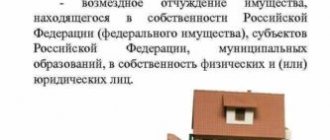The procedure for transferring federal property to municipal ownership
In order to obtain a conclusion from the state authority on the transfer of real estate into the ownership of subjects of the Russian state, local self-government organizations, it is necessary to collect the appropriate package of documents, which includes:
- extract from state a list of real estate where information about transferable property is entered;
- an extract on real estate from the Unified State Register, contractual agreements concluded on it on the possibility of transferring material assets into the ownership of the municipality (also on the legal rights of ownership of the adjacent territory to the transferred real estate, if this territory is indicated in the contract as a separate paragraph). The document form must be received at least 30 days before transferring it to FAUFI;
- copies of documents that confirm the fact that the transferred real estate is located in the State Unitary Enterprise, other federal authority on the basis of limited property rights, economic management (copies of these documents are also sent if there is no information about the legal ownership of real estate and the ability to dispose of it in the Unified State Register information base);
- documents confirming the right of the Russian state to own real estate and the adjacent territory, if such is indicated in the contractual agreement as a separate paragraph (these documents are transferred if there is no information about the legal ownership of real estate and the ability to dispose of it in the information base Unified State Register);
- permission from the state unitary enterprise or other government agency to transfer objects into municipal ownership, which are on the balance sheet of this organization on the basis of limited economic management with the signature of the person who issued this permission;
- a copy (original) of the set of rules of the state unitary enterprise, other state organization, the real estate of which is transferred to municipal ownership on the basis of economic management, limited property rights. The charter is also needed in the event of the transfer of ownership of the local government structures of the enterprise itself;
- a certificate from the Unified State Register of Legal Entities about a state unitary enterprise, another state organization, the real estate of which is transferred to municipal ownership on the basis of economic management, limited property rights. The same document will be needed when transferring the enterprise itself into the ownership of local government organizations;
- a certificate from a government agency that maintains equipment records, controls the availability of material assets, with information about property assets that are transferred to municipal ownership (the presence of this document is required if, for example, only a few separate premises are transferred from an entire building to the municipality) . This is necessary to clarify the inventory of such real estate;
- a diagram of the adjacent land plot to the real estate as a separate property that becomes the property of the local government;
- documents confirming the correct name of the local government apparatus, which is associated with the gratuitous transfer of real estate into municipal ownership;
- documents confirming the right to use the transferred real estate (the document must be submitted if this property is managed by bodies of constituent entities of the Russian state, state unitary enterprises, local self-governments, and other government agencies). These documents provide an opportunity to organize the transfer of property assets into municipal ownership legally;
- permission from the state executive body, which is vested with the authority to control state unitary enterprises and other structures whose real estate is transferred to municipal ownership on the basis of limited property rights and economic management. A similar document is also needed in case of transfer of the enterprise itself to a local self-government organization.
When transferring property assets into municipal ownership (if such property is represented by a state unitary enterprise or other government agencies), in addition to the documents listed above, you must additionally submit a list of such entities, as well as a list of real estate that they dispose of on the basis of a limited property.
law, economic management. To conclude on the transfer of property assets into federal ownership, you must additionally submit a list of transferred real estate objects. To conclude on the transfer of property to municipal ownership, the proposal must be sent to the FAUFI. This obligation falls on the executive branch organizations of Russian constituent entities.
To make adjustments to the state register of a local government organization when concluding a FAUFI, it is necessary to note in the documentation that the actual transfer of property assets into municipal ownership is possible only after the corresponding transfer act has been certified.
The Constitutional Court explained the features of the transfer of property from federal to municipal ownership
On April 11, the Constitutional Court of the Russian Federation issued Ruling No. 864-O in the case of the district court of the Krasnodar Territory challenging the provisions of the regional law on the delimitation of municipal property between it and its urban and rural settlements.
The Mostovsky District Court of the Krasnodar Territory addressed the Constitutional Court of the Russian Federation with a request to verify the constitutionality of clauses 1 and 2 of subsection 5 of Section 1 of Appendix 6 to the regional law of December 29, 2006 No. 1178-KZ on the delimitation of property owned by the municipal formation Mostovsky District, between the above-mentioned municipality and its newly formed urban and rural settlements. According to the contested norms, the list of property owned by the above-mentioned municipal entity and transferred to the municipal ownership of the Besleneevsky rural settlement includes two bank protection dams located on federally owned water bodies in the village of Besleneevskaya.
As follows from the case materials, the district court is considering an administrative claim by the prosecutor of the Mostovsky district of the Krasnodar Territory to declare illegal the inaction of the administration of the Besleneevsky rural settlement, expressed in the failure to take measures for state registration of municipal property rights to the said dams.
According to the applicant, the controversial clauses are unconstitutional, since they allow the possibility of classifying hydraulic structures, including bank protection dams, which should be in federal ownership, as municipal property.
Having studied the materials of the request, the Constitutional Court noted that the delimitation of state property is due to its purpose for carrying out the functions of the state and exercising the powers of federal and regional government bodies. As the Constitutional Court explained, the main legal act regulating the transfer of state property to municipal ownership is Resolution of the Supreme Council of the Russian Federation of December 27, 1991 No. 3020-I, Appendix No. 3 of which contains a list of objects related exclusively to municipal property.
The Court also emphasized that the decision on the admissibility of individual bank protection dams located on a water body located in federal ownership should be taken into account by the municipality, taking into account the intended purpose of municipal property and, accordingly, should not include property not intended to resolve local issues. meaning, the content of which is inappropriate and burdensome for the municipality. Based on the content of the Law on the General Principles of Organization of Local Self-Government in the Russian Federation, a specific hydraulic engineering facility may also be municipal property.
The Constitutional Court recalled the possibility of free transfer of property from one public owner to another. When transferring property from federal to municipal ownership, the position of local governments must be taken into account. Otherwise, it would give rise to the possibility of transferring into municipal ownership property objects that are ineffective from an economic point of view, which are objectively not needed to resolve issues of local importance.
Accordingly, the competence of the court, when deciding on the admissibility of transferring property from one municipality to another and on the possibility of finding a certain type of property in municipal ownership, includes not only establishing the fact of securing the possibility of transferring this property on the basis of a legal act, but also taking into account other circumstances. Thus, the court must take into account the legality of the location of this property in a public legal entity; the admissibility of finding a specific type of property in municipal ownership, taking into account its intended purpose and the need to ensure the principle of proportionality of local government resources to the powers granted.
Taking into account the above, the Constitutional Court came to the conclusion that the applicant’s request actually concerns the issue of compliance of the law of the constituent entity of the Russian Federation with federal legislation, as well as assessing the validity of the municipality transferring certain property into the ownership of the Besleneyevsky rural settlement. Since these issues are not within the competence of the Constitutional Court, it decided to refuse to accept the complaint for consideration.
Veronika Perfilyeva, senior lawyer in the real estate and investment practice at Kachkin and Partners, noted that the Constitutional Court’s determination is consistent with the judicial practice it previously formed, as well as with the legal norms defining the powers of the Court. “As the Constitutional Court correctly pointed out, the request of the Mostovsky District Court of the Krasnodar Territory requires an assessment and establishment of compliance or non-compliance of the law of a constituent entity of the Russian Federation with the current federal legislation in the field of delimitation of powers and property of public legal entities, as well as the legality and validity of the transfer of certain property into the ownership of a rural settlement from municipal formation, which does not correspond to the powers and grounds for considering the case by the Constitutional Court of the Russian Federation,” the expert explained. In her opinion, the Constitutional Court of the Russian Federation correctly indicated the compliance with which normative legal acts the district court needs to check the controversial provision of the law, while it did not predetermine how exactly the dispute should be resolved on the merits.
According to Eterna Law lawyer Andrey Parkhomenko, the main conclusion of the commented definition is that regional law allows for the possibility of classifying hydraulic structures as municipal property, which, according to the Constitutional Court, should be in federal ownership.
“The court recalled that the choice of a legal norm for resolving a particular case is the exclusive prerogative of the court considering the case on the merits; otherwise would be contrary to the principle of independence of the judiciary. In essence, the Constitutional Court of the Russian Federation established that the possibility of classifying a particular property as municipal depends on how burdensome and expedient it would be to be in municipal ownership,” the expert believes.
Transfer of property assets of legal entities and individuals into municipal ownership
The process of transferring property assets of legal entities/individuals into municipal ownership occurs as follows.
- In order to carry out the acceptance and transfer of an immovable object of the LSG, individuals and legal entities are required to submit a request to the head of the relevant organization. A package of installed documentation is attached to the request.
Legal entities must provide
- passport identifying the person who made the request;
- an extract from the Unified State Register of Legal Entities, copies of documents that are the legal basis for conducting activities and determining the legal status of the organization;
- documents confirming the competence of the authorized person (in case the request is made by a representative of a legal entity);
- a certificate from the Unified State Register for property, contractual agreements for it in terms of ownership of transferable real estate. Documents confirming registration in the state register and ownership rights to the transferred property assets must be submitted;
- list of real estate transferred to municipal ownership (addresses, important engineering components, including);
- a list of construction objects, additionally attached, built-in buildings that were transferred, according to the lease agreement of individual premises or entire objects, for the use of other legal entities (it is necessary to provide copies of such documents);
- act of OS, another structure of a legal entity that has the authority to conclude the transfer of property assets to municipal ownership;
- statement of balance sheet, which must indicate the initial and final cost;
- an extract from the state real estate cadastre, which contains the data required for state registration of rights to real estate and conducting transactions with it;
- documents confirming the rights of ownership of the land plot adjacent to the real estate, which are also subject to transfer into the ownership of the municipality;
- documentation containing the engineering characteristics of the real estate, a diagram of the technical inventory bureau (maximum 6 months before the expiration of the document);
- documentation confirming the balance sheet ownership of property assets;
- plans for engineering systems to be transferred;
- an extract confirming the organization’s complete absence of debt obligations, seizure of real estate, and other forms of financial liability.
Individuals represent
- passport proving the identity of the person making the request;
- an extract on the value of real estate;
- documents confirming the competence of the trusted person, her passport (if such a request is made by a representative of an individual);
- a list of real estate that is transferred to the ownership of the municipality (addresses and important engineering components must be indicated).
After completing the verification of the submitted package of documents, a special group of specialists is created who are involved in the transfer of municipal property into ownership.
The formed group is engaged in its own activities, based on the order established by the order of the head of the municipal authority.
Administrative structures, in accordance with the decision of the created group, draw up a list of real estate that must be transferred to the municipality. Next, this document is transferred to the executive structure of the local self-government, which issues a conclusion on the transfer of property.
Based on the conclusion made about the veracity of the presented list of real estate transferred into the possession of the municipality, the head of the municipal body issues an order for:
- transfer of objects, registration of them as your property;
- redirection of limited property rights of local self-government to property values;
- inclusion of real estate in the list of property assets of the LSG;
- redirection of the possibility of economic management of real estate to the municipal unitary enterprise;
- the right to dispose of federal property in other ways permitted by current legislation.
According to the order of the head of the municipal apparatus for the acceptance and transfer of Rosimushchestvo, protocols are filled out in the form established by Russian legislation. Documents for the acceptance and transfer of real estate are certified by the head of the municipal structure.
Next, the transferred property is entered into the MSG database, and state registration of the possibility of owning real estate is carried out according to the established system by the legislation of the Russian Federation.
If any disagreements arise during the period of acceptance and transfer of objects into municipal ownership, their settlement is carried out by the court or by a compromise decision of the parties to the contractual agreement.




